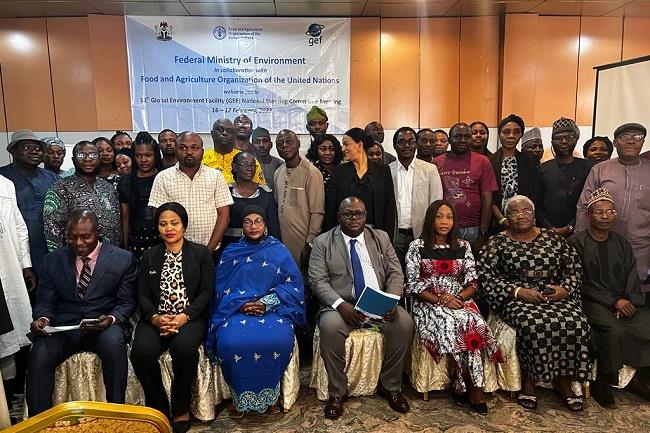The Food and Agriculture Organisation of the United Nations (FAO) has committed to help Nigeria meet targets that have been set towards achieving considerable reduction in the emission of greenhouse gases (GHGs) in the country.

FAO’s support in this regard, as disclosed by the organisation’s representative in Nigeria, shall be riding on opportunities provided by Nigeria’s participation in the eighth Global Environment Facility replenishment cycle (GEF-8) to collaborate with the government of Nigeria, by leveraging on FAO’s extensive technical expertise, strong field presence and in-country alliances.
Making this known during the 12th GEF National Steering Committee meeting held from February 16 to 17, 2023, in Abuja, the FAO Nigeria Representative, represented by the organisation’s Climate Change Specialist, Ms. Nifesimi Ogunkua, stated that “FAO will provide unparalleled knowledge, experience and technical assistance in the areas of biodiversity, climate Change, international waters and Land degradation,” within the Focal Areas that will be continued in GEF-8.
FAO says it will also provide unique support and partnership in the proposed GEF-8 Integrated Programmes, particularly in the areas of Food Systems, Ecosystem Restoration, Amazon, Critical Forest Biomes, Wildlife Conservation for Development, and Sustainable Cities.
“For us as FAO, the eighth GEF replenishment cycle (GEF-8), offers new opportunities for collaboration and impact, while leveraging on FAO’s extensive technical expertise, strong field presence and in-country alliances,” the FAO representative in Nigeria said, stressing also that FAO in Nigeria has been supporting government and will always support in convening diverse stakeholders, facilitate partnerships and mobilise resources for the government of Nigeria in designing and delivering projects that achieve sustainable, scalable results in the GEF-8 Focal Areas and Integrated Programmes.
Nigeria has participated in previous GEF cycles, the last (GEF-7) ending in June 2022.
Meanwhile, Nigeria’s Minister of Environment, Mohammed Hassan Abdullahi, has said the commencement of GEF-8 cycle provides another opportunity for Nigeria to start afresh and double the resolve towards a sustained and habitable environment with happy and healthy people with sustainable livelihood.
Speaking on the opening day of the 12th GEF National Steering Committee meeting, the minister, who was represented by the GEF Operational Focal Point, Mr Stanley Jonah, said the steering committee meeting, which was last held in 2018 due to the COVID-19 pandemic, is of strategic importance as Nigeria hopes to make the best of the new GEF cycle.
“The Steering Committee Meeting has been a forum for stakeholders in the GEF family in Nigeria to deliberate on the activities of the facility in Nigeria with a view of appraising the progress made so far during the preceding GEF cycle.
“Our contribution to the global greenhouse emission would be appreciated on the premise of some of the projects both ongoing and concluded. We remain committed to fulfilling our obligation to substantially cut our emission to cushion the global effect of climate change,” the minister stated.
While outlining efforts by the country towards reducing greenhouse gas emission, the minister said: “In recent time, Nigeria has added two efforts (waste and water) to our Nationally Determined Contribution (NDC) on successful submission of the enhanced NDC to the United National Framework Convention on Climate Change (UNFCCC) with an unconditional commitment of 20% and conditional commitment of 47% to achieve SGD7 by 2030, net zero emission by 2050.”
Similarly, the minister said Nigeria is making remarkable strides towards combating land degradation, and biodiversity loss through efforts of the Ministry of Environment with support from the Global Environment Facility.
This, he said, would help reduce the vulnerability of the people living in the dry lands as well as improve their well-being through improved use of land and other natural resources for sustainable development.
